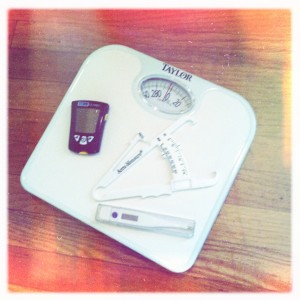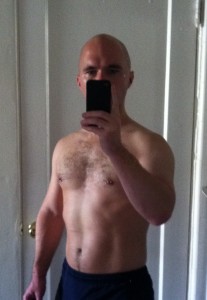 One of the keys to creating a lasting change in your health and fitness is by making slow and steady progress.
One of the keys to creating a lasting change in your health and fitness is by making slow and steady progress.
Without a way to directly quantify your progress and results, you’ll never get concrete evidence as to what works and what doesn’t.
In the spirit of radical transparency (and since I’m planning on trying out some crazy experiments this year), I’m going to start taking certain measurements and posting them here, so that I can share everything that I learn rather than keeping it to myself.
What I Will Be Measuring
I plan to take specific measurements each Saturday.
First off, I’ll be measuring my body fat percentage using Accu-Measure Fitness 3000 calipers and the Jackson-Pollock 7-point method. (No relation to the God-awful artist of the same name. 😉 )
I’ll also be measuring BMI with a Taylor analog scale. Despite its limitations, BMI is still a better tool than overall weight.
I’ll also be taking my oral temperature with a Rite-Aid digital thermometer. Although most people view body temperature as only being useful for diagnosing fevers, body temperature also acts as an indirect measurement of metabolism. The higher your body temperature, the more energy your body is burning in its day-to-day tasks.
Lastly, I’ll be measuring my blood glucose with a ReliOn Ultima meter. This is to get some idea of my insulin levels. In short, insulin is directly proportional to blood glucose, and since insulin appears to be the main fat storage hormone, I would like to track it.
But I’d like to add one big asterisk here. As much as the low-carb army likes to demonize insulin, the fact remains that:
- Insulin is an important hormone, whose effects go far beyond mere fat storage.
- Hormones such as leptin, cortisol, testosterone, estrogen, HGH, and too many others to list also influence the “body fat setpoint,” or the relative amounts of fat and lean mass your body tries to store.
As much as I’d like to measure these other hormones, it’s just not feasible. So in the meantime, I’ll track my blood glucose primarily because it’s easy rather than because I think it will reveal some great insight.
(And as a quick aside, if you would like to monitor yourself with this same equipment, it will only set you back about 30 bucks or so.)
What I Won’t Be Measuring
In Michael Pollan’s book In Defense of Food, he chastises the field of nutrition as being built up primarily on “parking lot science.”
This is based on a story of a man who loses his keys in a parking lot at night. Instead of looking where he dropped them, he spends all his time underneath the street light, since that’s the place he can see best.
In other words, just because something can be easily measured and monitored doesn’t mean it is actually worthwhile to do so.
Cholesterol is the best example of this. Everyone knows that high cholesterol causes heart disease, right? Wrong. Turns out half of all people that have heart attacks also have so-called “normal” cholesterol levels.
Whoops!
Here are some things that are easy to measure that I won’t be, either because I don’t think they are good predictors of health, or because they are too expensive:
- Cholesterol
- Blood Pressure
- Pulse Rate
So Where Am I At?
 For my first “weigh-in” of the year, I came out with the following:
For my first “weigh-in” of the year, I came out with the following:
- 12.8% body fat
- 24.1 BMI
- 97.1°F oral temp
- 80 mg/dL blood glucose
Overall, I’m pretty happy where I am at. 97.1°F is close enough to Dr. William Davis’ 97.3°F cutoff for healthy thyroid function for me to not be too worried, but still low enough that I’d like to try to get my metabolism chugging along a bit better.
80 mg/dL blood glucose is good in my book, well within the <99 that the ADA suggests, and even within the <86 that Chris Kresser suggests here.
BMI is also good, being on the far upper end of “normal,” which is where I’d prefer to be. But the 12.8% body fat was a bit dispiriting, especially as I came out at 10% last summer using bio-electrical impedance. But hey, at least I’ve got something else to work toward now!
Consistency vs. Accuracy
Which brings me to a key point: all of these measurements are inaccurate. As a guy who used to work in the laboratory of a pharmaceutical company, I can assure you that my calipers, glucose meter, and scale could never be certified to any reasonable degree of accuracy.
Calipers and bio-impedance are also two different measurement methods, and I wouldn’t be surprised if I still came up as 10% if I took one today. (Then again, I could end up at 16% as well!)
The key here, going forward, is not to have accurate results, but rather precise and consistent ones, so that I can see how I’m doing over time.
Do you have any other suggestions of measurements I should take? I’m all ears in the comments!
 I'm a science geek, food lover, and wannabe surfer.
I'm a science geek, food lover, and wannabe surfer.
{ 6 comments }
Consistency is definitely key…I have two BEI devices to measure body fat along with a caliper and the range is absurd! Even using the same device at two different times of day or a couple days in a row yields vastly different results. I use these as an overall gauge, but the mirror and tape measure mean a lot more to mean nowadays.
True story – if the same measuring device delivers results consistently (whether they are on the mark or not), it’ll still give you a great gauge as to how your diet/training is working for you.
Good on you Darrin, I be really interested in how it all goes.
I usually ignore scales or body fat and just eyeball it, it’s good enough for what I want but I agree measure if its important.
I think you are measuring everything that I can think of unless you want to do body measurements as well? but here is one I read about , see if you can get two weight scales and stand on both, in theory your weight should be equal on both sides unless you have a muscle imbalance then you should do corrective exercises to fix it.
Raymond
@Dave:
Yup, I’m gonna have to see how consistent things are over the next few weeks. I don’t imagine that the small amount of organ meats are going to make much of an impact in my measurements.
@Clint:
Yeah, I think people get too obsessed over how accurate it is rather than how effective it is at charting their progress.
@Raymond:
This is actually REALLY difficult for me, since I’m the kind of guy who likes to fly by the seat of his pants rather than rigorously measure and analyze. I might try the two balance method if I get a chance. Due to a knee injury, I think I favor my left leg over my right one.
Measuring is great, is a fantastic way to keep you motivated as you see results. sometimes the biggest measurer is the mirror and the way clothes fit. its an easy way to see where you are..
@Alejandro
Very true. It’s definitely hard for someone like me, who likes to improvise as much as possible, but I’m excited to see how this all turns out!
Comments on this entry are closed.